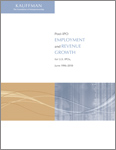As analysts debate over Facebook’s “failure” of an Initial Public Offering, one thing has been made clear through some recently released Kauffman Foundatio

n research: America’s slump in IPOs does not bode well for our nation’s job creation or economic growth. Not only does a company going public mean hundreds, if not thousands of high net-worth individuals and, in turn, potential investors in future startups, it also means a hiring surge.
But when our nation’s IPOs decreased 70 percent between 1996 and 2010, the jobs went with them. The report, “Post-IPO Employment and Revenue Growth for U.S. IPOs, June 1996-2010,” pointed out that nearly 1.9 million new jobs were lost in the past 10 years because fewer entrepreneurial companies joined the ranks as public companies. There was, however, something else of note in the pages of the report. After their IPOs, employment at emerging growth companies, meaning companies that are less than 30 years old and not spinoffs of another larger corporation, outpaced that of other public companies. But these young companies experienced a more drastic drop in IPOs than their more established counterparts.
Our hope with this report is that policymakers take note and then take action.
Robert Litan, vice president of Research and Policy at the Foundation had this to say in the press release, “It is important for policymakers to understand the extent to which highly successful startups – those that are able and willing to access the capital markets to finance their growth – expand their revenue and employment once they do go public. The authors of this report provide much-needed documentation that answers that important question.”
So as the discussion about Facebook will ebb and flow as the stock does likewise, I choose to look at it from the economic angle—the angle from which IPOs can be a catalyst for job and wealth creation in the United States.